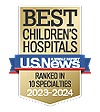For a child, a visit to the hospital is like entering a whole new world. At times, the language spoken in that world can leave kids feeling confused, scared or overwhelmed. But it doesn’t have to be that way.
The words we use to talk with children about their medical experience can make a big difference in how they adapt to the hospital environment, how they think and feel about their medical experience, and how they learn to communicate about their own medical needs. Parents and caregivers can make a few small shifts in language that can help kids feel better prepared for tests or treatments, and more in control of their care experience.
I asked Colette Case, Director of Child Life and Family Services at Stanford Medicine Children’s Health, for some suggestions. Here are just a few:
Instead of: | Say: | |
Anesthesia or “put to sleep” | Surgery sleep or sleepy medicine; explain that this is different from sleeping at night | |
Anesthesiologist | Doctor who helps with your surgery sleep, or sleepy medicine | |
Blood pressure cuff | Plastic cushion that gives your arm a hug; “This helps the nurse hear your heart beating.” | |
Dressing change | New, clean bandage | |
Gurney or stretcher | Bed on wheels | |
Incision or cut | Small opening that will close back up | |
IV or intravenous drip | Tube into your vein that medicine flows through. It’s the quickest way to help you get medicine, and get better. | |
Operating room | Place where you will have your procedure | |
Oxygen | Fresh air | |
Shot | Poke; a tiny needle that delivers medicine | |
Take your vitals | Measure how warm your body is, see how fast and strong your heart is beating (nothing is “taken” from the child) | |
Urine | Use child’s familiar term, such as “pee” | |
X-ray, CT scan, MRI | Machine that takes pictures of the inside of your body, from the outside |
“Kids develop their own feelings about their medical experience that may be more positive than we expect, or more negative than we might wish them to be,” says Case. She suggests using open-ended questions, positive comparisons, and non-judgmental phrasing to help empower a child to state the reality of their own experience, which can then help parents and care teams provide the right amount of support. For example:
Instead of: | Say: | |
That was very hard for you. | How was that for you? Was it the way you thought it would be? Or easier? What would you tell other kids to help them? | |
What a good boy/girl you were! | What a good job you did! | |
This part will hurt. | You may feel a pinch, sore, achy, scratchy, full, or another simple, specific term | |
As big as… (incision size) | Smaller than… | |
As long as…(e.g. duration of procedure) | Less time than it takes you to… | |
As much as… | Less than… | |
Don’t cry. | It’s okay to cry. What’s making you cry? (Hugs or holding hands are both great ways to support a child who’s crying. Taking a few deep breaths together can also help.) |
Words are important tools that doctors, nurses and parents can use to help kids have the best possible outcome—helping them understand, participate and play an essential role in their own medical care. But what adults have to say is just one side of the equation. “Oftentimes,” adds Case, “listening to what a child has to say can be even more important than anything we have to say to them.”
Authors
- Julie Greicius
- more by this author...


 Previous
Previous







